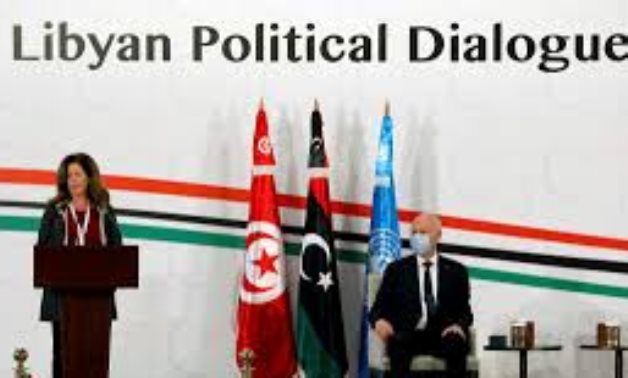
The United Nations envoy to Libya, Stephanie Williams
CAIRO -21 November 2020: The Acting Head of the UN mission in Libya (UNSMIL), Stephanie Williams, said that the UN Security Council has tools that prevent impeding the rare opportunity to restore peace in Libya, adding that organizing presidential and parliamentary elections in Libya is a significant requirement.
The UN envoy in Libya stated, during a press conference, that there is tangible progress in the Libyan dialogue, according to Al-Arabiya.
Williams stressed that the resumption of Libyan oil exports will improve the humanitarian situation, noting the Libyan elections will take place on December 24, 2021, saying, "We have set a road map for the future of Libya."
For his part, Britain's delegate to the Security Council welcomed the agreement reached to address the Libyan crisis. Britain’s delegate added during the Security Council meeting that it must ensure the cessation of foreign interference in Libya to ensure the implementation of the political solution.
The British delegate to the Security Council continued: "We are concerned about the deterioration of the health situation in Libya as a result of the outbreak of the Coronavirus."
For his part, Germany's delegate to the Security Council said: "We welcome the ceasefire agreement that was reached in Libya and must be implemented quickly, highlighting the need for the completed withdrawal of foreign fighters from Libya, saying," It is imperative to fully comply with the arms embargo to Libya."
In turn, the European Union said that the Libyan tracks had made progress that may constitute a historical turning point, explaining that external parties must adhere to the Berlin outcomes. "We are ready to help monitor the ceasefire in Libya," he said.
On November 12, Williams said "Libya’s warring sides will immediately reopen the main coastal road connecting the vast country’s east and west across front lines," as part of a ceasefire deal agreed last month, adding "the two sides would immediately begin work to reopen the road, including the removal of landmines and withdrawing fighters from the area.
As laid out in the Geneva ceasefire agreement, foreign fighters and mercenaries are to be transferred to Tripoli or Benghazi before departing Libya by Jan. 23
The implementation of the ceasefire is happening alongside political talks taking place in Tunis, where 75 delegates chosen by the United Nations on Wednesday agreed to hold elections within 18 months.
Oil-rich Libya has been mired in chaos since the ouster and killing of Muammar Gaddafi in 2011. It now has two rival authorities and a multitude of militias vying for control of the country.
The country’s internationally recognised government is based in Tripoli, while Khalifa Haftar, the commander of the Libyan National Army, is supported by a parallel administration based in the east.
Comments
Leave a Comment